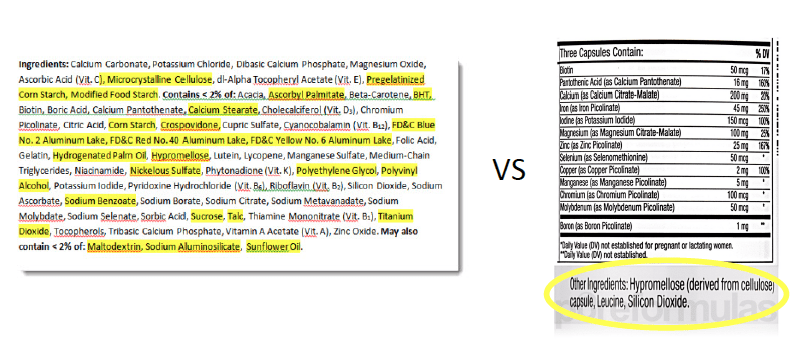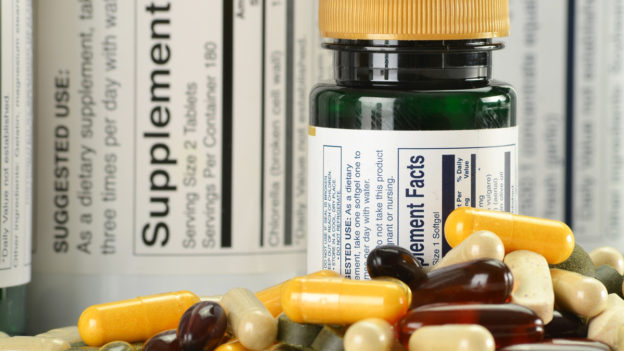KNOW WHERE YOU ARE GETTING YOUR DIETARY SUPPLEMENTS FROM!
As a consumer, there are several concerns about supplement purchasing of which you should be aware.
Dietary supplements are not regulated. There is no mandatory testing for quality.
- This means:
- The label doesn’t have to be accurate, the ingredients don’t have to be what the bottle says.
- The bottle says 60 mg of Vitamin C but there is actual 20mg or none at all!
- The pills are contaminated with things that aren’t on the label.
- I have heard of arsenic, lead, sugar, gluten, and Viagra (yes, Viagra) being in dietary supplements that weren’t supposed to contain them. (see articles below*)
- There isn’t the best form of the ingredients.
- Folic acid is cheap, but the body can’t use it. Some people can convert folic acid to methylfolate but some can’t! Better to use a supplement that contains what you actually can use. But you cannot find methylfolate in any of the common supplement brands available at stores.
- You want Magnesium for muscle cramps, so you go to the local store. Magnesium Oxide is cheap and readily available. You don’t know the difference and neither does anyone working at the store. But you get home and discover the hard way that that form of Magnesium isn’t absorbed and causes diarrhea. (Hint: Magnesium Glycinate gets absorbed)
- The cheaply made dietary supplements contain tons of fillers and preservatives.
- Maybe these aren’t as bad as Viagra or lead! But do we really need tons and tons of chemicals and colors in our vitamin pills?
Check out this side by side ingredients list of Centrum Multi (on left) vs a multi you would get from me: (everything highlighted in yellow is not a vitamin, completely unnecessary)

When you buy from a professional company through a health care practitioner the Health Takes Guts® FullScript Supplement Store, you can rest assured that you are getting clean high-quality dietary supplements:
- Everything is tested for purity and accuracy.
- The pills have exactly what the label says it has
- No contaminants
- The ingredients are high quality
- What your body can use, what’s best
- No preservatives, colors, gluten, or anything else you don’t need
The professional grade dietary supplements are designed to be sold through a practitioner who has knowledge on supplements. These brands are not available in most stores.
What about the dietary supplements on Amazon?
Some of the professional high-quality brands are starting to be sold on Amazon and other online stores.
- One problem with this is people taking things without getting proper advice on what their body needs.
- Another problem is these dietary supplements are not always kept in the conditions needed. Proper storage temperature, attending to expiration dates, and keeping the bottles sealed/unopened are some of the things that are NOT done when the supplements are purchased through a middle man such as Amazon.
- And lastly, and by far the scariest problem with Amazon, is that they sell counterfeit supplements! (Read the article!)
For these reasons, FullScript has allowed practitioners to create online stores for their clients. You can go to the Health Takes Guts® FullScript Supplement Store and create an account and shop with total assurance that everything is clean, tested, and safe.
*Articles demonstrating the dangers of buying non-reputable dietary supplements:
Unapproved Pharmaceutical Ingredients Included in Dietary Supplements Associated With US Food and Drug Administration Warnings
Published in 2018
Research Article: Click Here
Forbes Write-Up Article: Click Here
From 2007 through 2016, 776 adulterated dietary supplements were identified by the FDA and 146 different dietary supplement companies were implicated. Most of these products were marketed for sexual enhancement (353 [45.5%]), weight loss (317 [40.9%]), or muscle building (92 [11.9%]), with 157 adulterated products (20.2%) containing more than 1 unapproved ingredient.
Active pharmaceuticals continue to be identified in dietary supplements, especially those marketed for sexual enhancement or weight loss, even after FDA warnings. The drug ingredients in these dietary supplements have the potential to cause serious adverse health effects owing to accidental misuse, overuse, or interaction with other medications, underlying health conditions, or other pharmaceuticals within the supplement.
Justice Department and Federal Partners Announce Enforcement Actions of Dietary Supplement Cases
Published in 2015
Research Article: Click Here
CBS News Article: Click Here
As part of a nationwide sweep, the Department of Justice and its federal partners have pursued civil and criminal cases against more than 100 makers and marketers of dietary supplements. The actions discussed today resulted from a year-long effort, beginning in November 2014, to focus enforcement resources in an area of the dietary supplement market that is causing increasing concern among health officials nationwide. In each case, the department or one of its federal partners allege the sale of supplements that contain ingredients other than those listed on the product label or the sale of products that make health or disease treatment claims that are unsupported by adequate scientific evidence.
New York Attorney General Targets Supplements at Major Retailers
Published in 2015
New York Times Article: Click Here
The New York State attorney general’s office accused four major retailers of selling fraudulent and potentially dangerous herbal supplements.
Authorities conducted tests on top-selling store brands of herbal supplements at four national retailers — GNC, Target, Walgreens and Walmart — and found that four out of five of the products did not contain any of the herbs on their labels. The tests showed that pills labeled medicinal herbs often contained little more than cheap fillers like powdered rice, asparagus and houseplants, and in some cases substances that could be dangerous to those with allergies.
Many probiotic supplements claim to be gluten-free, but aren’t
Published in 2015
Today News Article: Click Here
New York Times Article: Click Here
Patients taking probiotics to help battle celiac disease may unwittingly be worsening their symptoms. A new study shows that many of these supplements contain the very substance they need to avoid: gluten.

